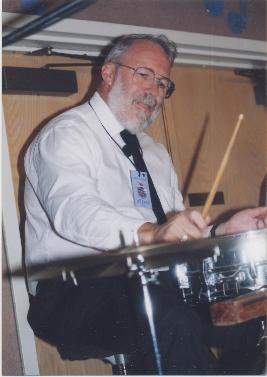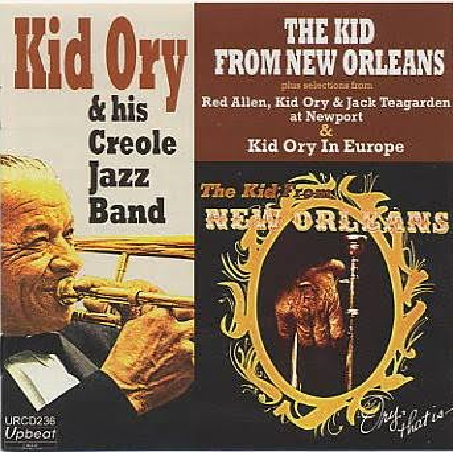KID ORY—“The Kid from New Orleans” (Upbeat URCD236). Total playing time: 78
mins. 52 secs.
The Kid from New Orleans
Snag It; Somebody Stole My Gal; Put on Your Old Grey Bonnet; Runnin’ Wild;
Swanee River; Ole Miss; Black and Blue*
Red Allen, Kid Ory, & Jack Teagarden at Newport
Jack Teagarden Introduction; Muskrat Ramble*; High Society
Kid Ory in Europe
Memphis Blues; Washington and Lee Swing; Basin Street Blues; Tiger Rag;
Dippermouth Blues; South.
Recorded on Oct. 27, 1957 in Los Angeles, California (The Kid from New Orleans);
July 4, 1957 Newport Jazz Festival, Newport, Rhode Island (Red Allen, Kid Ory, &
Jack Teagarden at Newport); Dec. 5, 1956 Théâtre des Champs Élysées, Paris, France
(Kid Ory in Europe).
Collective personnel: Kid Ory, trombone, vocal* and numerous others, including
Jack Teagarden, Marty Marsala, Darnell Howard, Cedric Haywood, Frank Haggerty,
Wellman Braud, and Earl Watkins, Jr., to mention some.
This disc, part of the Kid Ory LP reissue series on CD that Upbeat has been releasing,
is comprised of the following: tracks 1-7 from Verve LP MGV1016 (The Kid from New
Orleans) tracks 8-10 from Verve LP MGV8233 (Red Allen, Kid Ory, & Jack Teagarden
at Newport); tracks 11-16 from Verve LP MGV8254 (Kid Ory in Europe – the other
two tracks from this LP being on URCD 259).
All of the selections on this CD reissue are well known—indeed, some could be
called “standards’” for the genre—and the combination of LP’s provides something of
a contrast between bands and performances. The group of seven tracks that form the
first “half’ were recorded in a studio, making for excellent sound—the balance
meticulous, the tone warm. The band is very relaxed, as the laid back tempos
indicate, and there is no rush for the finish line on any of the tunes. The rhythm
section lays down a solid four-beat base, the anchor being Frank Hagerty’s chording
on guitar, the sound of which Ory preferred to that of the banjo. Darnell Howard
supplies some nice filigree work with arpeggios behind Marty Marsala’s clean
trumpet lines, Ory growling away in the background. There are no histrionics here,
Marsala being content to stay mostly in the middle register although he shows he is
also comfortable in the upper register on occasion. Everyone is given the chance to
solo, but the emphasis is always on the ensemble which frames each solo and often
provides backing riffing. Earl Watkins was not a flashy drummer, but kept solid time
and his four-bar tags are always tasteful, with no accidental rim shots or cymbal
crashes. These tracks are, for me, the highlight of the recording, and I could have
wished there were more of them.
The other “half,” the last six tracks, suffer a little from comparison. They are recorded
at a live performance in Paris and do not enjoy the “perks” of a studio recording. The
balance is off somewhat, Kansas Fields bass drum pounding four-to-the-bar rather
loudly. That, coupled with his penchant for playing a backbeat on the snare, and
when called on to solo, doing so in rather rambunctious fashion, detracts. The crowd,
of course, loves it all, whistling and cheering and egging the performers on. The
result, overall, makes for a less than satisfying listening experience. Tempos become
a bit frenetic, with Basin Street Blues being fairly brisk and flirting with disaster in the
double-time portion of the piano solo, followed by Tiger Rag bursting out of the gate
and not relenting until it was over. Undoubtedly the musicians were caught up in the
raucous audience response, but musicality suffers in consequence.
Sandwiched between these two “halves” are a couple of tracks from the Newport
Festival of 1956. (Track 8 is not really a track as it is merely a short spoken
introduction by Jack Teagarden with no musical content.) The two cuts Muskrat
Ramble and High Society are just small, almost perfunctory jam sessions and, being
somewhat of a mish-mash, deliver little that is worthwhile. The audience response,
fairly restrained, seems to indicate a similar assessment.
So it is a mixed bag, really. I would want the CD for the first seven tracks alone, and
each time I play it in future it will be for these. The rest will get only an occasional
hearing.
While Upbeat is an English label, this CD can be purchased in the U.S. at www.
cduniverse.com, which stocks Upbeat releases, or at the Upbeat site, www.upbeat.co.
uk, which provides for ordering by mail if one clicks on “New Releases.”
|
|



